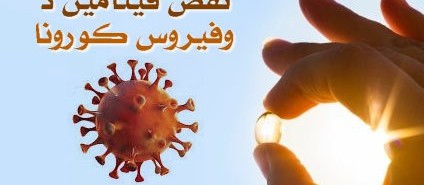Vitamin D deficiency and corona virus
Scientists from the University of Chicago have found that vitamin D deficiency and an increased risk of COVID-19 have a particularly strong relationship
Vitamin D is known to protect against viral infections such as colds and flu. Due to the vitamin's immunomodulatory properties and active research for a safe and effective treatment for COVID-19, vitamin D has received widespread attention for its potential role in protecting against the dreaded disease.
In a recent study, scientists from the University of Chicago found that a lack of vitamin D and an increased risk of contracting COVID-19 have a strong relationship. In particular, they found that patients deficient in vitamin D had a 77 percent increased risk of testing positive for COVID-19.
These findings suggest that vitamin D supplementation may reduce the likelihood of contracting COVID-19, lead researcher David Meltzer told United Press International. The results appeared online in the journal JAMA The Open Network.
Vitamin D status may determine risk of COVID-19 infection
To determine whether vitamin D levels affect rates of COVID-19, researchers collected patients whose vitamin D levels had been measured within a year prior to COVID-19 testing. Of the 489 patients, 124 (25 percent) had insufficient levels of vitamin D, while 287 (59 percent) had adequate levels of the nutrient. The remaining patients had "unconfirmed" vitamin D levels.
Multivariate data analysis revealed that patients with vitamin D deficiency had a 77 percent higher risk of testing positive for COVID-19. In contrast, aging, which previous studies have linked to a higher risk of COVID-19, appears to only cause a six percent increase in patients' risk.
Vitamin D is inexpensive, accessible, and safe to consume for most of the general population. Therefore, understanding whether or not improving vitamin D levels changes the risk of COVID-19 is very important both nationally and globally, Meltzer said.
The study also highlights the need for more studies that can prove whether or not vitamin D can reduce the risk of COVID-19. The researchers themselves have initiated several clinical trials to this end at UChicago Medicine. (Related: Vitamin D: Are You Getting Enough of This Essential Vitamin?)
Vitamin D deficiency is also associated with an increased risk of COVID-19 infection in children
In the first study of its kind, two researchers from Dijla University in Turkey studied the relationship between vitamin D status and the risk of infection with COVID-19 in children. Their study included 40 patients between the ages of one month and 18 years old, all diagnosed with COVID-19 and hospitalized. The age of the patients was matched to that of healthy subjects.
Researchers found that 72.5% of children diagnosed with COVID-19 were either deficient in vitamin D or had insufficient levels of the nutrient. Of all the study participants, two patients admitted to the intensive care unit had the lowest vitamin D levels (less than 10 nanograms per milliliter [ng/ml]). Both also suffer from comorbidities.
Furthermore, children diagnosed with COVID-19 who were either deficient or had insufficient levels had higher fevers than those with normal vitamin D levels.
Looking at their findings, which appeared in the Journal of Pediatric Pulmonology, the researchers concluded that vitamin D status may be associated with the occurrence of COVID-19 in pediatric patients.
Vitamin D supplementation as a viable form of treatment
The promising protective effects of vitamin D against COVID-19 remain an active area of research. But that hasn't stopped health experts from seriously considering vitamin D supplements as a viable form of treatment for the disease.
For example, British Health Secretary Matt Hancock has urged people to take vitamin D supplements given recent evidence that micronutrients can provide some degree of protection against the virus.
“[We will] increase public messaging around vitamin D to make sure people get the message that vitamin D can help with overall health and there is no downside to taking it,” Hancock said.
MP David Davis applauded this statement, adding that people with a vitamin D deficiency and people at higher risk of COVID-19, including the elderly and those with comorbidities, should get free vitamin D supplementation on their own. the speed.
Sources include:
ScienceDaily.com
WND.com
UPI.com
JAMANetwork.com
OnlineLibrary.Wiley.com
NutraIngredients.com


